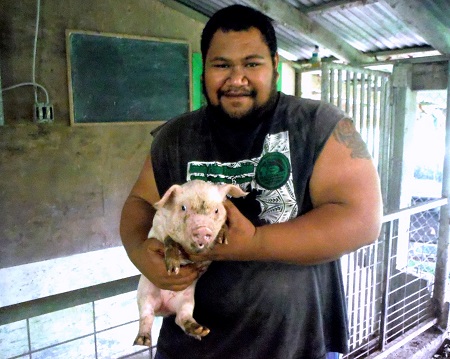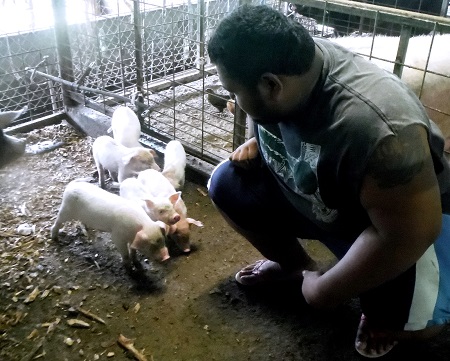
ASCC-ACNR Agricultural Extension Assistant Fili Uta displays one of the healthy piglets born this summer as part of the Swine Artificial Insemination Project. The project seeks to address the decline in health of Tutuila's pig population due to in-breeding. (Photo: J. Kneubuhl)

ASCC-ACNR Agricultural Extension Assistant Fili Uta checks on a litter of piglets born this summer as part of the Swine Artificial Insemination Project. The project seeks to address the decline in health of Tutuila's pig population due to in-breeding. (Photo: J. Kneubuhl)

ASCC-ACNR Agricultural Extension Assistant Fili Uta displays one of the healthy piglets born this summer as part of the Swine Artificial Insemination Project. The project seeks to address the decline in health of Tutuila's pig population due to in-breeding. (Photo: J. Kneubuhl)
ASCC-ACNR (Land Grant) Partners with Dept. of Agriculture to Address Swine Health Issues
August 24, 2016
By James Kneubuhl, ASCC Press Officer
Over the summer, the Agriculture, Community and Natural Resources (ACNR, also known as the Land Grant Program) division of the American Samoa Community College (ASCC) has observed the first positive results of its ongoing effort to address major health issues among American Samoa’s swine population. In partnership with the Department of Agriculture, ACNR began work in January of this year on its Swine Artificial Insemination Project, and this summer ten sows penned both at ACNR and with various community farmers gave birth to litters of piglets whose size and health signs evidence a marked improvement over previously born baby pigs.
The overall health of American Samoa’s swine has gradually declined over the last 20 years, largely as the result of inbreeding. Since the late ‘90s, a ban on the importation of live pigs from off-island has resulted in an ever-shrinking gene pool which in turn has led to many piglets born not only undersized, but also more susceptible than is typical for their species to ailments such as hemophilia. “Farmers have been coming to us for decades now, asking if we could offer a solution to the declining health of their livestock,” said ACNR Extension Coordinator Molly Asifoa-Lagai, “but none of the methods of assistance we’ve tried have proved successful until now.”
The ACNR team working on the project includes Asifoa-Lagai, Animal Specialist Dr. Michael Hansell, Agriculture Extension Program Manager Autagavaia Alfred Peters, and Agriculture Extension Assistant Fili Uta. The team gained valuable assistance from Dr. Halina Zaleski, Extension Specialist in Swine at the University of Hawaii at Manoa. Dr. Zaleski's area of extension and research interest is swine production management, including artificial insemination, livestock waste management, herd health and biosecurity, and swine welfare. A certified trainer for the National Pork Board's Pork Quality Assurance Plus Program, Dr. Zaleski visited American Samoa in March to give workshops at ACNR and make site visits to local pig farms. Staff from the Department of Agriculture, including its Veterinarian, participated in the workshops.
While on island, Dr. Zaleski gave demonstrations of the artificial insemination method, and the Department of Agriculture assisted by approving the necessary import permits, issued by the Chief Quarantine Officer and Director Lealao Purcell, for the semen from healthy male pigs to be transported into the Territory from the mainland. Following Dr. Zaleski’s departure Dr. Hansell and the Agriculture Extension staff continued to monitor the treated sows both at the ACNR compound and on local farms. With sows capable of producing as many as 14 offspring at a time following their gestation period of approximately three months, the first positive results of the March inseminations arrived over the summer when 10 out of 12 (83%) of the artificially impregnated animals gave birth to 105 piglets with better overall health and a higher-than-average survival rate of 70%.
Asifoa-Lagai said that over time the healthy piglets will grow to adulthood and be used to breed with local sows, but it will take several years before the majority of the island’s swine benefit from the science-assisted gene infusion, so ACNR plans to continue with the artificial insemination project for the immediate future. “Having to ship the healthy swine semen by air from a laboratory in the US Midwest all the way to American Samoa and coordinate its application within its lifespan of seven days presents a challenge,” she said, “but the results over this summer have given us a lot of encouragement at finally reaching a solution to a longstanding problem with our swine farming.”
For additional contributions to the project, ACNR Director Aufa’i Apulu Ropeti Areta expressed his gratitude to Director Lealao Purcell, Deputy Director Peter Gurr, Junior Akaisa Eseroma, Christian Jensen and Steve Tafaovale of the Department of Agriculture; Neil Gurr, Alopopo Su’esue’e, Amio Mavaega-Luvu, Tolomoa Alalamua, Paolo Talolo, Fellin Ponausuia and Helen Lago of ACNR; and ASCC students Faatoia Areta and June Talamoni.
Farmers who would like more information on the artificial insemination project can contact Autagavaia Alfred Peters of ACNR at 699-1575.
